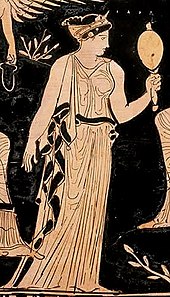| Revision as of 18:01, 3 January 2023 editPaul August (talk | contribs)Autopatrolled, Administrators205,543 edits Fix← Previous edit | Revision as of 17:38, 7 April 2023 edit undoColinSchm (talk | contribs)Extended confirmed users582 edits →Description: link to the book instead of authorNext edit → | ||
| Line 7: | Line 7: | ||
| ==Description== | ==Description== | ||
| Pausanias (author of '']'') wrote this of ] in ], ], in the 2nd century A.D.: | |||
| <blockquote>The altar shows parts. One part is to ], ], and ], another is given up to heroes and to wives of heroes, the third is to ] and ] and Amphiaraus and the children of ]. But ], because of his treatment of ], is honored neither in the temple of Amphiaraus nor yet with Amphilochus. The fourth portion of the altar is to ] and Panacea, and further to Iaso, Hygeia, and ]. The fifth is dedicated to the ]s and to ], and to the rivers ] and ].</blockquote> | <blockquote>The altar shows parts. One part is to ], ], and ], another is given up to heroes and to wives of heroes, the third is to ] and ] and Amphiaraus and the children of ]. But ], because of his treatment of ], is honored neither in the temple of Amphiaraus nor yet with Amphilochus. The fourth portion of the altar is to ] and Panacea, and further to Iaso, Hygeia, and ]. The fifth is dedicated to the ]s and to ], and to the rivers ] and ].</blockquote> | ||
Revision as of 17:38, 7 April 2023
Greek goddess of recuperation from illnessTemplate:Greek myth (other gods)
Iaso (/ˈaɪ.əsoʊ/; Template:Lang-el, Iasō) or Ieso (/aɪˈiːsoʊ/; Template:Lang-el, Iēsō) was the Greek goddess of recuperation from illness. The daughter of Asclepius, she had four sisters: Aceso, Aegle, Hygieia, and Panacea. All five were associated with some aspect of health or healing. For more information on the genealogy of Iaso, see Panacea.

Description
Pausanias (author of Periegesis of Greece) wrote this of Amphiaraus in Oropos, Attica, in the 2nd century A.D.:
The altar shows parts. One part is to Heracles, Zeus, and Apollo Healer, another is given up to heroes and to wives of heroes, the third is to Hestia and Hermes and Amphiaraus and the children of Amphilochus. But Alcmaeon, because of his treatment of Eriphyle, is honored neither in the temple of Amphiaraus nor yet with Amphilochus. The fourth portion of the altar is to Aphrodite and Panacea, and further to Iaso, Hygeia, and Athena Healer. The fifth is dedicated to the nymphs and to Pan, and to the rivers Achelous and Cephisus.
Aristophanes mentions Iaso humorously in Ploutos, when one of the characters, Cario, reports that Iaso blushed upon his passing gas.
In the temple of Amphiaraus at Oropus a part of the altar was dedicated to her, in common with Aphrodite, Panaceia, Hygieia, and Athena Paeonia.
Iaso had many children.
References
- Schmitz, Leonhard (1867). "Iaso". In William Smith (ed.). Dictionary of Greek and Roman Biography and Mythology. Vol. 2. Boston: Little, Brown and Company. p. 552.
| Ancient Greek deities | |||||||||||||
|---|---|---|---|---|---|---|---|---|---|---|---|---|---|
| Early deities | |||||||||||||
| Titans |
| ||||||||||||
| Olympian deities |
| ||||||||||||
| Water deities |
| ||||||||||||
| Personifications |
| ||||||||||||
| Other deities |
| ||||||||||||